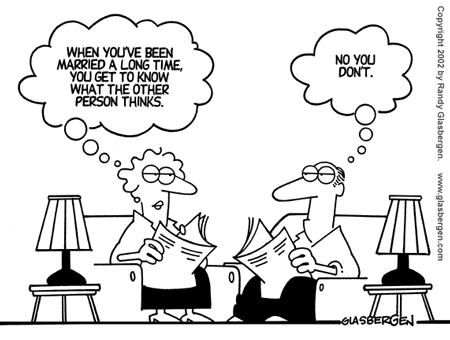For one reason or another, we discussed the concept of marriage in our last Talk Show classes. To tell the truth, I personally expected a generally positive attitude towards marriage; however, in action, the results were mixed to say the least.
As usual the classes were started by quotations:
"Love: a temporary insanity, curable by marriage."
Ambrose Bierce
Ambrose Bierce
“To be happy with a man you must understand him a lot and love him a little. To be happy with a woman you must love her a lot and not try to understand her at all.”
Helen Rowland
Helen Rowland
“Women marry men hoping they will change. Men marry women hoping they will not. So each is inevitably disappointed.”
Albert Einstein
Albert Einstein
“More marriages might survive if the partners realized that sometimes the better comes after the worse.”
Doug Larson
Doug Larson
"I have always considered marriage as the most interesting event of one's life, the foundation of happiness or misery."
George Washington
George Washington
"Fundamentals of marriage" was the initial point that started the debate among the learners. The principles include: love, communication, respect, shared interest, ability to resolve conflict, accepting changes, trust, shared responsibility, and honesty.
The participants went on and described the importance of each and every one of the elements. Apart from love that was almost unanimously acknowledged as the chief cornerstone of any kinship that fuels the process of engagement, the second most important aspect for the majority of the student were trust and honesty which can turn the outcome of any relationship based on its availability or lack thereof.
Although we can not ignore the fact that most believed marriage to be a finite social [and a perpetual spiritual] contract that would not insure anything but a mere official recognition. Thus I asked about the real guarantee for such unions, and the immediate response was love itself. In this way, the younger participants simply dismissed the current traditions regarding marriage and claimed that intimate relationship ought to proceed for years and years before finally evolving into marriage.
How to Create a Successful Marriage -- powered by eHow.com
We then warned the students with unsound marriage statistics and high divorce rates especially within developing societies. The reason behind such stats is, more often than not, intense emotional attachment that hinders the process of logical thinking.When a relationship enters the stage of marriage before the affectionate passion is subdued, the results are seldom satisfactory.
Fortunately the bulk of married learners were gratified by their marriage and considered a substantial relationship prior to marriage, which is aimed at earning experience and evaluating the partner in the most unbiased manner, the key to a successful future for the couple.
Then 12 stages of marriage were narrowly discussed : courtship, living together, marriage , having a family , first child entering the school, last child entering school , first child entering puberty , last child entering puberty, first child leaving the house ,last child leaving the house , becoming grandparents and finally retirement.
In the end we realized that while marriage is of vast importance, it not only needs to be chosen wisely, but also demands maintenance and care throughout.
Further Readings :
Two Keys to a Happy Marriage
12 Ways to Have a Happy, Healthy Marriage
How to Maintain a Good Marriage Relationship?








